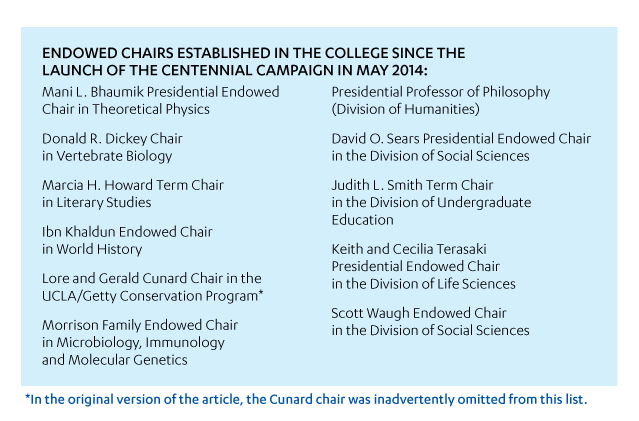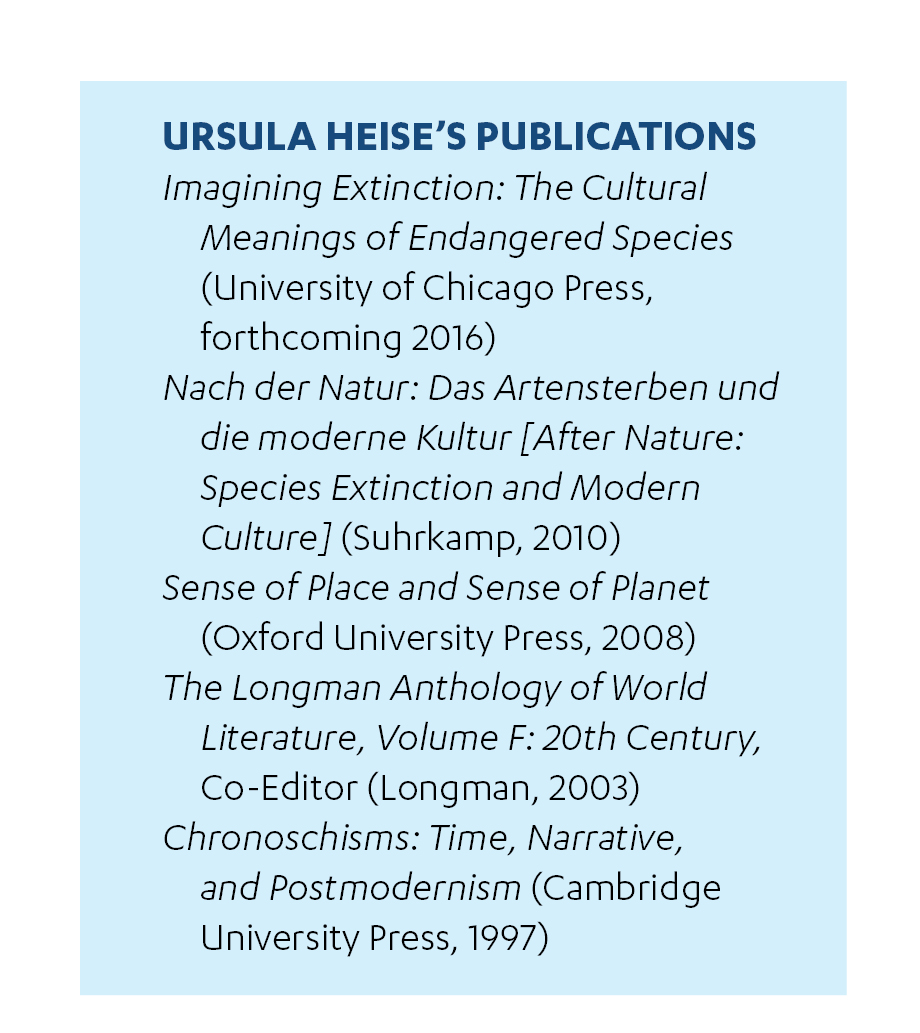UCLA faculty voice: The art of copying has been lost in the digital age
Copying and syncing digital files is easy now — perhaps too easy. A mere $10 a month buys you identical copies of a digital song on every device and computer you own.
Copying and syncing digital files is easy now — perhaps too easy. A mere $10 a month buys you identical copies of a digital song on every device and computer you own.
Universities today face a daunting challenge: how to serve new generations of increasingly diverse students whose ways of learning reflect our era’s rapid changes in technology and educational access.
For the second year in a row, no non-white actor was among the 20 acting nominations for the Academy Awards. NPR’s Kelly McEvers talks about the awards and Hollywood’s struggles with diversity with Darnell Hunt, director of UCLA’s Ralph J. Bunche Center for African American Studies.
Elected to the National Academy of Sciences in 1977, Reiss was an accomplished physical chemist and theorist who worked in a variety of fields, including including solid state, statistical mechanics, nucleation and colloid phenomena, polymers, electrochemistry, thermodynamics and device physics.
Domesticating dogs from gray wolves more than 15,000 years ago involved artificial selection and inbreeding, but the effects of these processes on dog genomes have been little-studied.
Eleven new endowed faculty chairs established in less than two years.
A groundswell of philanthropic support has resulted in 11 new endowed faculty chairs in the UCLA College since the public launch of the Centennial Campaign in May 2014. This bumper crop of endowed chairs has strengthened efforts to attract and retain game-changing, groundbreaking faculty.
Ever since UCLA’s first endowed chair was created in 1928 by Mr. and Mrs. C. N. Flint, private donors have generously supported the research and teaching of distinguished faculty in the College. Highly coveted in the academic world, endowed chairs recognize exceptional faculty members for their past and potential scholarly contributions while also providing dedicated funds for the chair holder’s research. At a public research university like UCLA, they are a particularly important recruiting tool.
UCLA Chancellor Gene Block said, “Today more than ever, endowed chairs are vital to UCLA’s continued research and teaching excellence. This form of philanthropic support levels the playing field and allows us to compete with other top-tier universities in hiring the best faculty.”
Noting the ripple effect of endowed chairs, senior dean of the UCLA College Joseph Rudnick said, “World-class faculty members attract the most talented graduate and undergraduate students, who in turn go on to make their own imprint on the world.”
Matching funds from the University of California
A big boost to endowed chairs in the College came in July 2014 when University of California President Janet Napolitano announced the Presidential Match for Endowed Chairs, designed to spur private giving to UC. Several donors stepped up to meet the match, resulting in four new presidential endowed chairs in the divisions of Humanities, Life Sciences, Physical Sciences and Social Sciences.
The recent additions to the College’s list of 93 endowed chairs span areas as diverse as theoretical physics, literary studies, vertebrate biology and world history, and include a chair devoted to innovative teaching in the Division of Undergraduate Education.
Donors who established endowed chairs were motivated by the desire to leave a lasting, impactful legacy and ensure the future excellence of one of the world’s great public universities.
Distinguished Professor of Psychology and Political Science David Sears, who established the David O. Sears Presidential Endowed Chair in the Division of Social Sciences, said, “I know that competing with private universities for the best faculty is a challenge. I feel it is necessary for those of us who value public higher education to step up if we can.”
Mani Bhaumik, a physicist, author and entrepreneur who established the Mani L. Bhaumik Presidential Endowed Chair in Theoretical Physics, said, “As a scientist, I realize the importance of supporting faculty who do basic research, especially theoretical physics that is at the foundation of all sciences.”
Rudnick expressed gratitude for the generosity and foresight of those who have established endowed chairs.
“They understand that endowed chairs are an investment not only in the intellectual fabric of UCLA but in future generations and future discoveries.”
For more information about how you can support faculty in the College, please contact Megan Kissinger at (310) 206-0667 or mkissinger@support.ucla.edu.
Marcia Howard ’54 considers UCLA her second home – no great surprise given that 20 campus committees and organizations have benefited from her leadership, advocacy and philanthropy for more than 60 years. Most recently, she contributed a lead campaign gift of $1 million to establish the Marcia H. Howard Term Chair in Literary Studies – with a preference given to environmental humanities or Shakespeare studies – in the English department. The inaugural holder of the Howard Chair is English professor Ursula K. Heise, who holds a joint appointment in UCLA’s Institute of the Environment and Sustainability.
A retired insurance broker, Howard is a member of the Dean’s Centennial Campaign Steering Committee and past recipient of the Alumni Association’s University Service Award. In addition to the humanities, she has supported many other units and initiatives on campus, and she underwrites an annual faculty recognition event for the Fiat Lux undergraduate seminar program.
But it is her fervent belief in the importance of a humanities education that compelled her to endow a chair in the English department.
“The study of humanities is essential to all aspects of life,” Howard said. “It teaches us to think, reason, write, and explore the meaning of what it is to be human.”
Dean of Humanities David Schaberg said, “We are incredibly fortunate to have in Marcia Howard such a vocal and passionate advocate for the humanities. Her recent gift has highlighted the importance of endowed chairs, which recognize the work of our most distinguished faculty.”
Longtime love of UCLA
A native Angeleno, Howard made frequent childhood visits with her family to UCLA from their home in west Los Angeles. In particular, she recalls building a snowman in the main quad after a rare snowfall. Much later, as an undergraduate, Howard was involved in several campus organizations including the homecoming and junior prom committees. She worked closely with Bill Ackerman, head of Associated Students from 1933 to 1967 and for whom Ackerman Union is named, who used to joke that she “majored in activities.”
Howard studied at the Center for European Studies in Strasbourg, France, during her junior year, igniting a lifelong love of travel and European history and literature. After graduating with a B.A. in history, she resisted her mother’s advice to go into teaching and worked as an activist in Georgia in the budding civil rights movement. Returning to Los Angeles in 1961, she found a job at an insurance company where she not only discovered her vocation but also met her future husband, Herbert, with whom she spent many happy years until he passed away in 2007.
Professor Heise awarded inaugural chair
Howard was gratified to learn that Heise, a renowned scholar in environmental humanities, would be the first to hold the chair. Environmental humanities is an emerging interdisciplinary field that brings together anthropologists, philosophers, geographers, literary scholars, historians, and new media scholars to study the influence of cultures on how we define nature. The field prepares graduates for a variety of careers including museum work, civic engagement, community organizing, nature education, literacy education, advocacy, business, writing, and the arts.
Heise received a Guggenheim Fellowship in 2011 and is past president of the Association for the Study of Literature and the Environment. Her research and teaching focus on contemporary environmental culture, literature and art in the Americas, Western Europe and Japan; theories of modernization and globalization; literature and science; and the digital humanities.
Heise, who currently works on stories and images of endangered species in different countries, said, “You cannot even begin to think about these issues without knowing something about the sciences. In addition, you often have to know about certain social sciences and about the legal, governmental and historical dimensions that frame our concerns with endangered species. But the narratives are crucial: In the end, biodiversity conservation comes down to values, ideas and stories we tell about what animals and plants we want around, and which ones we’d rather do without.”
Bringing literary scholarship to environmental discussions
According to English department chair Ali Behdad, literary scholars have until recently been left out of the debate regarding the environment, a field dominated by scientists.
“I believe that literary scholars like Ursula have a lot to contribute by educating citizens to make better decisions in an era of rapid environmental and social changes,” Behdad said. “We are grateful to Marcia Howard for helping us to increase the visibility and impact of this important field.”
Since joining the faculty in 2012, Heise has helped UCLA become a leader in the field, capitalizing on its location in a city marked by dense and diverse populations as well as an impressive mix of environments, from a thriving metropolitan region to ocean and desert landscapes and mountain ranges.
“Marcia’s gift is very forward-looking,” Heise said. “I so appreciate her belief in my work, which I hope will help people better understand and appreciate biodiversity and the stories we tell about endangered species.”
For her part, Howard is convinced that faculty like Heise are vital to educating well-informed citizens of the future, and she feels privileged to have been able to make an impact.
Howard’s philosophy is very simple. She said, “By making a gift, you receive a gift, and UCLA has certainly been a great gift to me.”
For more information about supporting the Humanities at UCLA, please contact Sarah Murphy at (310) 794-9005 or smurphy@support.ucla.edu.
Distinguished professor of paleobiology J. William “Bill” Schopf and his wife, plant biologist Jane Shen-Miller, believe everyone should do their “little bit” to improve the world.
“We tend to view our senses as flawless and think that to see is to believe,” she said. “So it’s eye-opening to learn that our perceptions are flawed.”
UCLA remains one of the nation’s best values among public colleges and universities, according to the 2016 Best College Values ranking published today by Kiplinger Personal Finance.
![]()
1309 Murphy Hall
Box 951413
Los Angeles, CA 90095-1413
(t) (310) 206-1953
(f) (310) 267-2343
